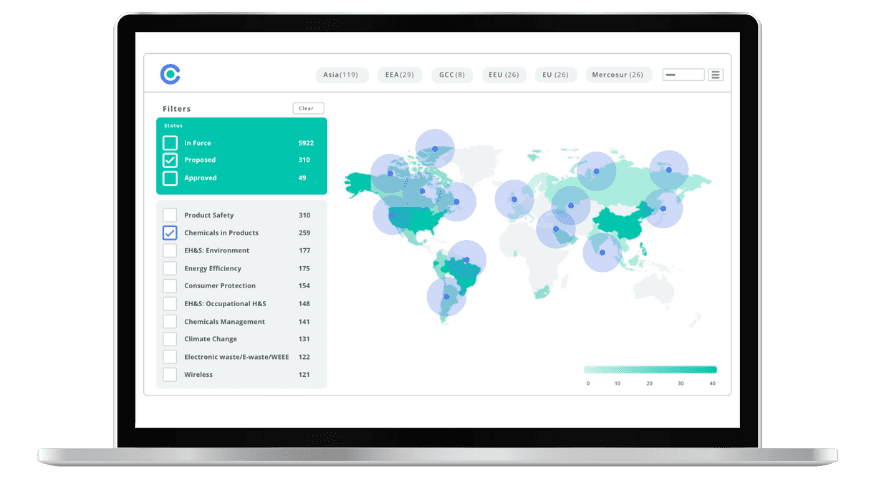
Insights from the OECD Forum on Due Diligence in the Garment and Footwear Sector

This blog was originally posted on 17th February, 2025. Further regulatory developments may have occurred after publication. To keep up-to-date with the latest compliance news, sign up to our newsletter.
AUTHORED BY EMILIA ASSENZA, SENIOR REGULATORY COMPLIANCE SPECIALIST AND TEAM LEAD, COMPLIANCE & RISKS
This year, the OECD Forum on Due Diligence in the Garment and Footwear Sector, held in Paris on 11-12 February and streamed online, focused on making mandatory due diligence work in the garment and footwear sector. With 800 on-site and 2500 online registered participants, the Forum explored solutions for the efficient and effective implementation of due diligence in garment supply chains.
A number of side sessions were also held virtually from 10-13 February, discussing due diligence under different perspectives, ranging from environmental and labor risks and responsible contracting to circularity of textiles and country-specific scenarios (see full panel here).
The conference particularly drew from two OECD resources, published on 11 February 2025 and presented in the context of the individual panels:
- Measuring the uptake and impact of due diligence for responsible supply chains
- The role of sustainability certifications in due diligence in the garment and footwear sector
Below are some highlights discussed at the conference.
Opening Session
The opening session discussed the existing challenges of due diligence practices. The Ministry of Foreign Affairs of Bangladesh provided an overview of the current situation in the country, underlining that, while more factories are embracing certification and sustainability, the increased costs are often not reflected in prices. In addition, the impact of AI developments, which are likely to transform the manufacturing space and lead to tension and worries among workers, need to be taken into account when looking at the social pillar.
From the discussion, the need emerged for “binding and enforceable” principles to make due diligence work. The EU Corporate Sustainability Due Diligence Directive (CSDDD) is the most relevant example that constitutes the basis to improve businesses’ practices. Urgent concerns were raised about the recent request to delay the corporate sustainability requirements in the EU (see our blog for further information).
Taking the investor’s point of view, the panel furthermore highlighted that investors are generally very much in favor of mandatory supply chain due diligence, which contributes to more transparency and the creation of a level playing field.
The transition from voluntary to mandatory practices is key to ensuring transparency and accountability for all companies. The OECD is planning to launch a platform to share information among stakeholders and policy makers in order to facilitate uniform implementation, with the objectives of ensuring policy coherence. The intent is to expand the rules to other sectors (i.e. the financial sector) and additional stakeholders, such as retailers and trade unions.
Purchasing Practices
Another session focussed on the practical implications of sustainable and responsible purchasing, with panelists sharing their insights on how accountability can be reached through well-defined processes along the supply chain. By way of example, those processes may include:
- Consideration of labor costs throughout the supply chain
- Contracts/binding purchasing practices which outline how to collaborate across the production line and what suppliers are held accountable for
- Better refinement of financial liability for the materials bought
- Establishment of both internal and external KPIs
As part of the panel discussion, brands that have successfully implemented responsible purchasing practices emphasized that purchasing should just be seen as a tool to reach the overarching goal of improved working conditions that are really felt on the ground. Long-term design strategies and working with high-quality materials that don’t go out of fashion and can be used in several collections were highlighted as some of the crucial factors when building lasting and reliable supplier relationships. Standardized purchasing practices, with consistent expectations across the board, furthermore empower brands to ask the right questions and allow suppliers to become accustomed to requests for necessary data and certification.
As a matter of fact, speakers acknowledged that challenges remain to be addressed, particularly at the country level. Panelists highlighted the current difficulties of cooperation with all relevant parties in certain countries and the importance of collaboration with social parties and brands. The involvement of trade unions, for example, is crucial to obtain information on the actual working conditions of a specific country and collective bargaining is needed to factor in workers protection in purchasing orders.
Responsible Disengagement
Considering the issue from a different angle, the session on responsible disengagement focused on the circumstances under which companies may/may not continue a particular business relationship, taking into account:
- Severity of the harm, such as severe occupational health and and safety risks to workers
- No significant improvement with respect to certain scenarios within a certain timeframe from the adoption of a risk management plan
- Mitigation not feasible because of prohibitive financial costs
Disengagement should be done responsibly by:
- Consulting with relevant stakeholders and taking appropriate measures to prevent or mitigate adverse impacts
- Complying with national laws and international labor standards, including relevant collective bargaining agreements
- Providing sufficient notice when possible
OECD standards, in particular the Guidelines for Multinational Enterprises and the Due Diligence Guidance for Responsible Supply Chain in the Garment and Footwear Sector, as well as the escalation protocol of the International Accord, help companies to decide when to disengage. The OECD Minerals Guidance offers additional recommendations where a decision to discontinue business relationship can be led by inhuman and degrading workers’ treatment and worst forms of child labor. The panel however highlighted the need for more guidance to support decision-making when faced with significant geopolitical instability.
Looking at the application of these guidance documents in practice, Miran Ali from the Bangladesh Garment Manufacturers and Exporters Association (BGMEA) told the panel that these protocols are often not respected, especially since brands in many cases don’t engage with the supplier directly, but through an agent. These issues became particularly visible during Covid-19.
Union and Worker Engagement
Working conditions were addressed in a dedicated roundtable on day 2, with a strong focus on the freedom of association and collective bargaining agreements.
Examples were given with regard to the situation in Pakistan, Cambodia and Bangladesh, where lack of engagement among all parties involved in the supply chain – from brands to suppliers, local governments and trade unions – is causing unfair working conditions. While in many cases, legislation and labor rights are in place, rights enforcement is usually at the core of the issue, with workers that speak out being blacklisted. While agreements such as the Global Framework Agreement and the International Accord can contribute to mitigating some of these issues and help unions to engage directly with brands and not only with suppliers, there is still a lot of work to be done, especially with regard to the scaling up of these initiatives and their expansion beyond work safety issues.
Conclusion
Highlighting the complexities of sustainable purchasing practices, worker engagement and responsible disengagement, the 2025 OECD garment forum made it clear that sustainable and responsible textile production still has a long way to go. While new guidance on the measurement, monitoring and evaluation of due diligence measures will help to focus more on the effectiveness of due diligence in practice, the urgency of addressing systemic issues like wage stagnation and suppression of union activity, particularly within the context of the evolving geopolitical landscape, remains.
For further information on the event, please consult the OECD website here.
Stay Ahead Of Regulatory Changes in Due Diligence in the Garment and Footwear Sector
Want to stay ahead of these regulatory developments?
Accelerate your ability to achieve, maintain & expand market access for all products in global markets with C2P – your key to unlocking market access, trusted by more than 300 of the world’s leading brands.
C2P is an enterprise SaaS platform providing everything you need in one place to achieve your business objectives by proving compliance in over 195 countries.
C2P is purpose-built to be tailored to your specific needs with comprehensive capabilities that enable enterprise-wide management of regulations, standards, requirements and evidence.
Add-on packages help accelerate market access through use-case-specific solutions, global regulatory content, a global team of subject matter experts and professional services.
- Accelerate time-to-market for products
- Reduce non-compliance risks that impact your ability to meet business goals and cause reputational damage
- Enable business continuity by digitizing your compliance process and building corporate memory
- Improve efficiency and enable your team to focus on business critical initiatives rather than manual tasks
- Save time with access to Compliance & Risks’ extensive Knowledge Partner network

Bird’s Eye View of Global AI Regulations: US, EU, UK, Singapore and China
Gain insights into how different jurisdictions are addressing AI-related challenges and what these developments mean for businesses, policymakers, and compliance professionals.


